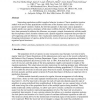Free Online Productivity Tools
i2Speak
i2Symbol
i2OCR
iTex2Img
iWeb2Print
iWeb2Shot
i2Type
iPdf2Split
iPdf2Merge
i2Bopomofo
i2Arabic
i2Style
i2Image
i2PDF
iLatex2Rtf
Sci2ools
CG
2010
Springer
2010
Springer
A cellular model for spatial population dynamics
Interacting populations exhibit complex behavior in nature. Classic quadratic iteration models with two or three populations exhibit some of the features seen in nature, but fail to account for spatial variation. Indeed, the diversity paradox is that many classic population models predict one species dominates while nature exhibits diversity. While various schemes have been presented to address this dilemma, we present a simple, deterministic cellular model that incorporates classic iteration schemes and a spatial migration component that provides for self-organizing and rich behavior. Our visualization method allows us to observe dynamically changing predominance of species, global diversity, waves of species progression, and highly organized spiral structures.
CG 2010 | Classic Iteration Schemes | Classic Quadratic Iteration | Computer Graphics | Exhibit Complex Behavior |
Related Content
| Added | 09 Dec 2010 |
| Updated | 09 Dec 2010 |
| Type | Journal |
| Year | 2010 |
| Where | CG |
| Authors | Chu Yue (Stella) Dong, James T. Long, Clifford A. Reiter, Corey Staten, Rytis Umbrasas |
Comments (0)

